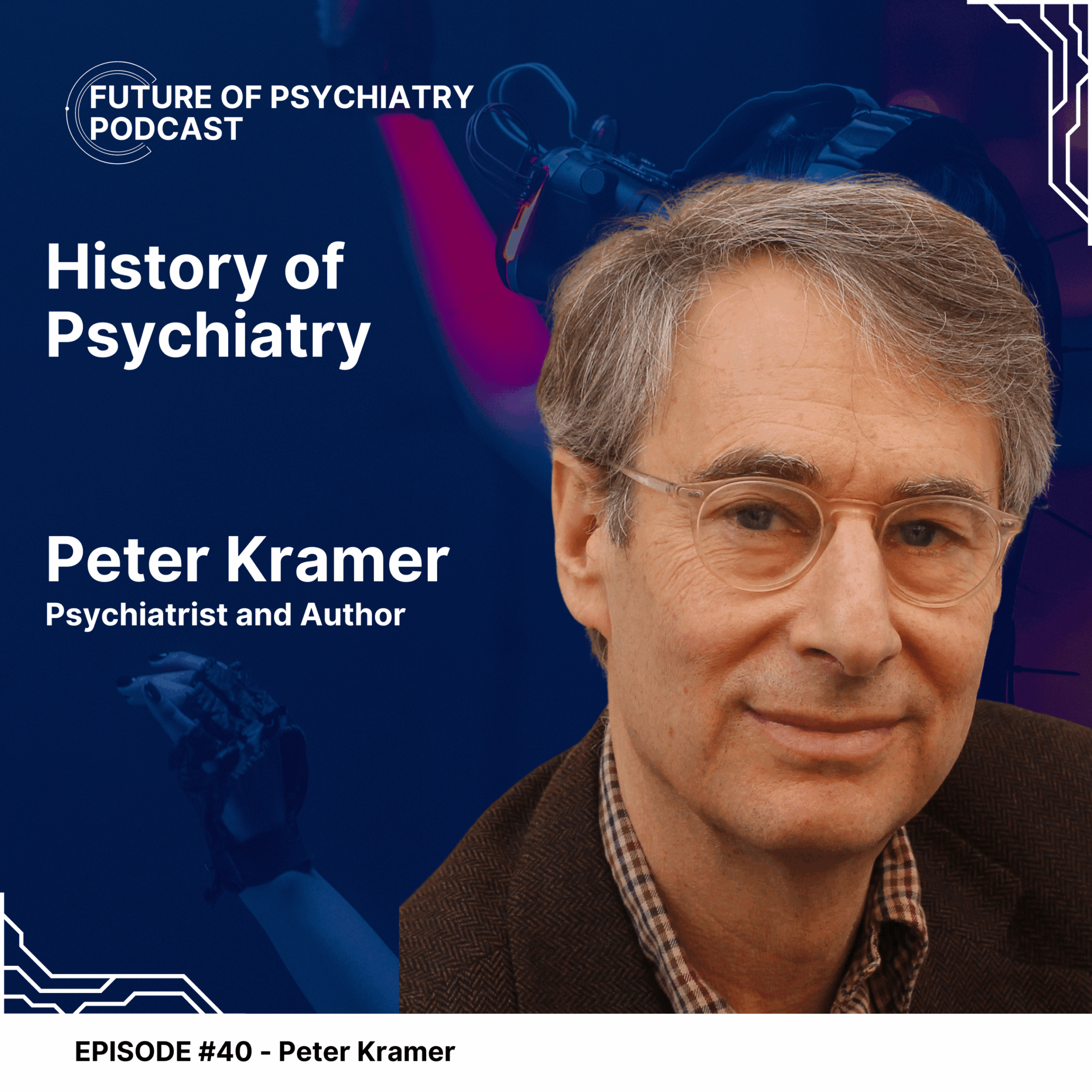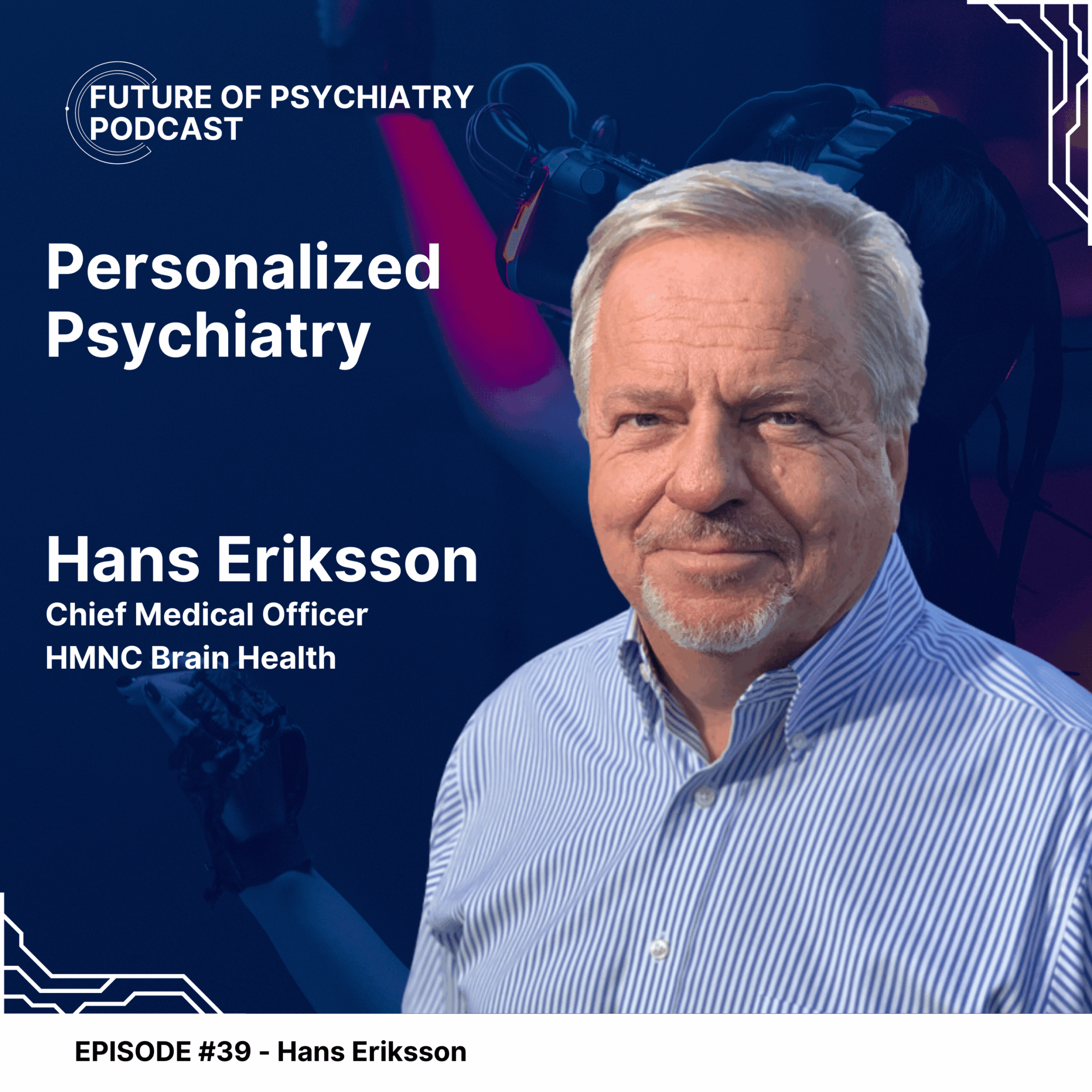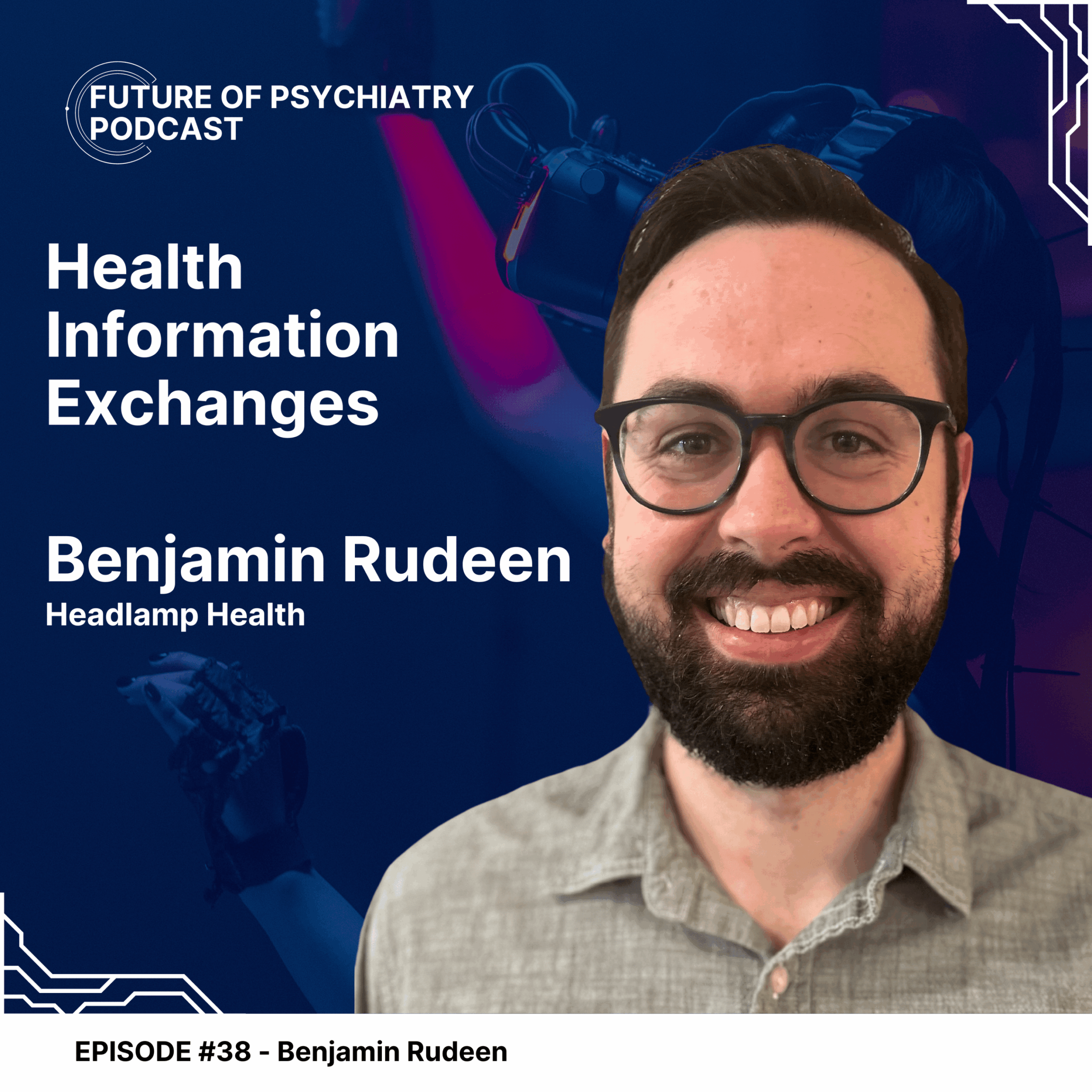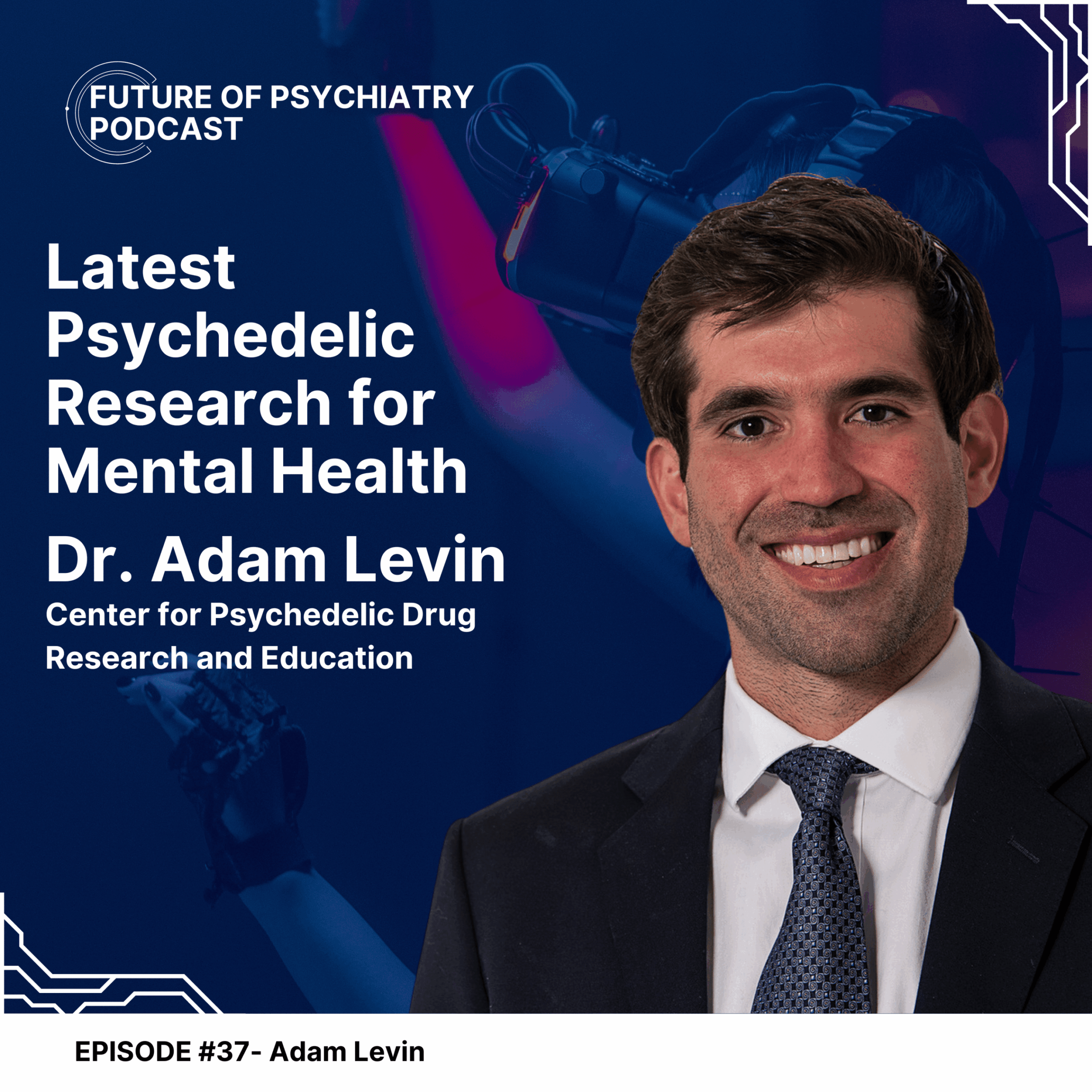#FuturePsychiatryPodcast discusses novel technology and new ideas in the field of mental health. New episodes are released every Monday on YouTube, Apple Podcasts, etc.
Summary

Ania Wysocka of Rootd, the #1 app for anxiety and panic on the App Store.
We had the pleasure of speaking with Ania Wysocka, who is the founder of Rootd, an extremely popular app that is designed to help individuals with anxiety and panic attacks. Ania developed the app when she had experienced panic attacks and found no app that felt suitable to her. Guided by her original mission to develop an app that was practical and easy to use for her demographic, Rootd is a fun (Ron!) yet scientifically sound app that incorporates many fundamental principles of anxiety treatment. Despite the easy temptation to embrace its scientific validity and claim its a one-stop-shop for treatment, she describes the app as fitting in symbiotically with the therapist-patient relationship, and notes the app regularly also encourages users to seek therapy as well. She strikes a balance between astute listening of her user base in incorporating more features, yet wanting to be focused on her mission and not overextend, for example into AI, prematurely, “It’s really important to know exactly what we are sharing with users and to not have to kind of be in control of that, because with other tools, you might have a suggested response,” via an AI model. Ania also understands the importance of data privacy in mental health apps. Fear of privacy concerns would inhibit a user from embracing certain core features, such as journaling. Understanding the importance of this, she notes “all of that data is stored locally, so we don’t actually see any of that. That’s completely private for the user.”

Chapters / Key Moments
00:00 Preview
01:37 Ania’s Background
02:45 How did you get started?
05:00 What was the beginning of Rootd like?
06:55 What does Rootd mean?
09:35 What is the trajectory of a typical user?
11:10 What is your favorite part of the app?
12:27 What are the next features?
13:39 Seeking FDA approval?
15:23 Specific features working on?
16:35 Why are clinicians referring patients?
18:26 Incorporate clinician dashboard?
20:44 Any misconceptions?
23:08 How does Rootd help relationships with therapists?
28:34 What do you see in 5 years?

Transcript
Preview
Ania Wysocka: You know in 2016, 2017, this just wasn’t something that was very talked about. And so I was feeling somewhat stigmatized for what I was experiencing. I was experiencing a bit of shame around it. And so, to have so many other people say and open up and say, “hey, I actually experienced this too,” like you just did, that is now I’m getting more used to it. But it was so bizarre different for me before. I didn’t realize that I wasn’t as alone as I felt. And so I guess that number isn’t something I could have predicted, but I certainly felt like the users who did experience it would resonate with it. Just a lot more users than I thought.
Introduction
Bruce Bassi MD: Hello and welcome to the Future Psychiatry podcast, where we explore novel technology and new innovations in mental health. I’m your host, Dr. Bassi, an addiction physician and biomedical engineer. If you are joining for the first time, I would greatly appreciate if you subscribe and share it with your friend network on social media. Additional resources, a full transcript and group discussion forum can be found on our website, telespychhealth.com. Then click ‘podcast’ in the top right corner. Thank you so much for joining us and I hope you enjoy the discussion today. So welcome. Today we have Anya Wysocka here today. She’s the founder of Rootd, which is an extremely popular app with over 2 million downloads geared towards people with anxiety and panic attacks. This is such a cool opportunity to talk to you. Thank you so much for taking the time out of your busy schedule to be on the show. Really appreciate it. Welcome.
Wysocka: Awesome. Thank you so much for having me.
Ania Wysocka’s Background
Bassi: So I know you’ve probably given your spiel before of your background, but I think it’s pretty interesting about how you came about with this idea. Maybe for the listeners who haven’t heard your previous interviews, tell us a little bit about how you came up with this idea.
Wysocka: Certainly, yeah. So I was in my final year of university when I first experienced a panic attack. And at the time, it really felt like it came out of nowhere. I had no idea what was happening. I didn’t have a ton of resources to also manage it and navigate it very well. I was on student loans, far away from home. I didn’t have a family doctor. It was a really confusing time. So I took to my phone to see if there’s something there that could help, and there wasn’t. There were apps that were very medical in nature, apps that were hypnosis based, and nothing that really spoke to me in my demographic. So that’s the story of why I wanted to create Rootd.
Bassi: That’s almost very similar to why I created this podcast. I feel like we all have this experience of there being a need and I think social media and the internet is being an incredible resource for people and for clinicians now I think we need to start to embrace that and start to be in on that conversation. I think that’s so cool you have that opportunity to really change the way that anxiety and panic attacks are treated.
Getting Started
Bassi: So how did you get started with figuring out how to incorporate the scientific data into something that’s very usable and attractive to use?
Wysocka: I’ve always really loved to draw and paint, so kind of took that from paper and canvas to the screen digitally. I was teaching myself Photoshop and Illustrator and different tools for designing posters and websites and stuff. So that came naturally in the sense that I kind of knew what I wanted to see and what would have been comfortable for me. So I took that and basically taught myself how to create wireframes. I did go to an agency and ask for a quote for creating an app like this, and it was much out of my budget, so I was like, okay, I got to go back to the basics and kind of start from scratch here. And yeah, so that’s really how it started. It was just kind of drawing in my notebooks and then putting it on the screen in a program that helped me create the wireframes.
Why Usability Is So Important
Bassi: You’ve probably looked in the App Store for other apps that treat anxiety, and you’ll see the whole gamut there. You’ll see apps that are created by government agencies that are just a little bit rougher on the edges, but they probably have a lot of scientific validity to them. And so you definitely need to strike a balance. It could be really well validated, but if people don’t enjoy using it, then what good is it, really? So I think that your creative background really served you well to your advantage. That must be why it’s so popular, right? Among other reasons.
Wysocka: I think that’s a great point. I think the fact that I was coming at it from a lived experience perspective, and I can really resonate with the users because I was the user, I think that has a huge influence on its public reception. And you’re totally right, sometimes those other apps, while well meaning, don’t necessarily reach the demographic in the way that they intend to, for those reasons. It can be feel a little off or like it’s not really speaking to you, whereas I was building Rootd for myself and my demographic. So it came, I guess, more naturally in that sense.
What were the first features?
Bassi: I know that you started off working and doing customer service, which I admire because I actually did that myself too, to be a little scrappy, and trying to get the company off the ground. What would we have seen when we were using Rootd when it first came out versus now? What was the beginning like for it, and why were those features there first?
Wysocka: So the very first feature was the panic attack button, and that’s the button that actually provides you with immediate relief during a panic attack. So that was incredibly important to have in the first iteration. I really wanted to see if that would resonate with people, if the design that made sense to me would make sense to other folks. And then also the lessons on understanding anxiety and where anxiety comes from because it’s so important to understand the physiological sensations happening in your body as that can be part of the really overwhelming piece that really debilitates a lot of people. You hear often of people going to the hospital thinking that they are having a heart attack or that they might be dying. Unfortunately, that’s how bad symptoms of panic attacks can get. It cause sensations that might make you think that. So it’s really important to understand, I think, what’s going on in the body and the mind when these things are happening. And so that was the other source. So it was basically the SOS panic attack button and the lessons on understanding panic attacks.
Bassi: Very cool. One thing that I have in common with you is that I used to actually run a lot and in fact, I ran so much that doctors and physicians say that people who run long distances can have certain heart arrhythmias. And so I developed a heart arrhythmia when I was 25, 26, called AFib and it woke me up out of the middle of the night and I thought I was dying. I could have used Rootd at the time, but I went to the ER and they’re like they kind of shrugged it off because it’s not an emergency necessarily, even though you feel it’s an emergency. So I literally had my first experience with the panic attack from running, which typically was a very healthy trait and blew off a lot of stress for me back in the day throughout my high school and college career. But it kind of backfired in a way, but in the moment you’re just really frozen and you need something safe to turn to. Is that kind of get into the name Rootd? Is that from being grounded?
Wysocka: Totally. Yep, you got it. The idea is that when you look at a huge tree, like an oak tree, let’s say, and there’s a storm, it’s not going to be swaying as much, it’s not going to topple over unless there’s like a huge storm. But basically the idea is to get rooted. It’s to have those roots in the ground. It’s to not have to be swayed by every event, to be able to handle different situations with more solidity.
Why is it so popular?
Bassi: Your app is incredibly popular. What do you think the reason for that is? And did you expect the certain features that are popular when you were incorporating them in the app? Did you think that those would be the thing that makes it popular?
Wysocka: I think that to answer the first question, it’s a combination of both that lived experience and the language in the app. Something does really resonate with users when they do download the app. On top of that, I do a lot of organic marketing. So rather than advertising it’s things like keyword optimization and interacting with users on social, interacting and engaging with users who are already using the app to make sure it’s the best it can be for them. I think that’s a big– there’s like a combination of what the reason is, why it’s popular. But in terms of if I thought that the tools would be popular, I’d say I thought that they would really resonate with people who experienced what I had. I was quite confident about that. However, I had no idea how many people were experiencing what I experienced because back in the day, in, you know, 2016, 2017, this just wasn’t something that was very talked about. And so I was feeling somewhat stigmatized for what I was experiencing. I was experiencing a bit of shame around it. And so to have so many other people say and open up and say, “hey, I actually experienced this too,” like you just did, now I’m getting more used to it. But it was so bizarre different for me before. I didn’t realize that I wasn’t as alone as I felt. And so I guess that number isn’t something I could have predicted, but I certainly felt like the users who did experience it would resonate with it just a lot more users than I thought.
What’s the trajectory of a typical user
Bassi: You do certainly feel very alone when you’re in the midst of a panic attack and you really feel like you can’t think about anything else. One thing that I think, well, I’m kind of aficionado of tech and I like to try a lot of different apps and maybe I’m a little biased in that because my carry-through with completing an app and actually sticking with it is probably pretty low. I don’t know if that resonates with other listeners too, because there’s just so many options. It’s very competitive space. What do you see as the trajectory of a typical user? Do they get treated? I know not everybody is treated from anxiety, but there’s a lot of psycho education that takes place and maybe it plateaus to some point. What’s the typical length of time that a user is using Rootd?
Wysocka: It really depends on the type of user. So we’re noticing two different types of personalities or segmentations and one has to do with users who experience acute panic attacks. And so that’s something that they might experience very frequently, and they’ll be some of the power users, and they are perhaps users who might find a way to graduate from Rootd, in a sense, when they no longer feel those sensations and they can kind of get back to their lives and get back to their regular schedules and feel more empowered to do so, whether that’s going back to school or work. And then on the flip side, we have users who experience general anxiety, and so that’s typically less acute, but they’ll actually keep the app for quite a long time because they know that, okay, it’s not debilitating in the sense that my life is on pause, but I should be working on my visualizations. I should be journaling, I know, to practice my breathing. And so they might use it less frequently than the panic attack users, but for even longer.
What are the features of Rootd?
Bassi: Got you. Maybe that’s a good segue into telling the listeners about what they would see when they’re using Rootd. There’s this learning component, journaling, breathing, visualizing, and then the sleep element. I love that you included sleep as a separate function. That’s like I’m a huge fan of talking about that in terms of patient improvement. What is your kind of favorite component or do you not look at it like that?
Wysocka: It’s tough. Previously my favorite one was definitely the SOS button because it’s what I used and now thankfully, my anxiety is so much better, I’m able to do things that I wasn’t able to do when I was really struggling. So I think that journaling is probably my favorite now because it’s interactive. I love seeing all the Ron mascot images and the different emotions and I just love the interactivity of those pages and that’s something I’m going to keep bringing into other pages in the app as well. Maybe that’s my favorite now, but it changes. It changes whenever there’s a new feature, I fall in love with it and then get excited about it and then eventually move on to another feature. But to your comment on sleep, so important. I think people who have anxious thoughts, not even necessarily anxiety or panic attack disorder, but just anxious thoughts and stress, like it can really affect your sleep first and we’re so much more grounded and fortified when we have a good night’s sleep to deal with everything else.
How will engagement be improved?
Bassi: Absolutely. How do you hope to kind of improve that level of engagement? Do you incorporate any more sort of personalized feedback or are you going to hope to incorporate AI? I know that’s the big topic these days, but what do you see in the future? How you’re going to improve the app?
Wysocka: Yes, I think that definitely some personalization in the app. There’s already a little bit the tool is very interactive. Depending on how you’re feeling, you decide how you want to get started. With Rootd, you decide how you want to walk through a panic attack. So that already is personalized in the sense because you get to choose your experience. But definitely trying to get the users, trying to get to know them a little bit more, that’s one of the priorities for the next quarter is really understanding when a user downloads Rootd, are they going to like– what is their intent with it? Because I can see after the fact which tools were most popular and most used, but I’m curious how that aligns with what they were looking for when they first signed up for Rootd. And a lot of my focus is really on listening to users, understanding their feedback and working with it.
Is FDA approval a goal?
Bassi: That’s so cool. That’s going to be a great element that makes you– you’re already successful– but continue to be successful to get a beat on what people are liking and what people need more of and how to continue to approve. I love that. I saw on your guys website that in 2021 it’s become scientifically validated and that’s really cool. It made me wonder, are you guys ever seeking to get FDA approval for it to be used as a digital therapeutic? And what’s that conversation like?
Wysocka: Not at the moment, I think, because such a small team that I think just staying focused is really important. I’ve also heard, and I’d have to look into this more, but if you do have FDA approval, you can no longer be on the app stores. I don’t know if you know any more information about that, but the app stores is where we get most of our users. It’s where our biggest level of distribution is. So that’s something I’m always considering. And despite not having the FDA approval, having the scientific validation has been very helpful. And some of our top referrers are clinicians, doctors, psychologists. So these relationships are super important. We want to continue working on that. We’re going to do another study because I think it’s important to continuously evaluate the app and the tool in that context. But yeah, no FDA approval project for now.
Bassi: I don’t know the answer to that. I’m trying to think of Reset-O, and Somryst those are the two that come to mind that I know of, which are FDA approved digital therapeutics for addiction and sleep, respectively. And I don’t know what the users workflow is once I write the prescription, how they actually download the app, or if it’s just on a website or what have you.
Wysocka: Okay, yeah, that might be information from last year too, when I was looking into it. So I should definitely explore. But I guess for now, we’re just not focused on that.
Bassi: I hear that often with other startups that they just don’t see that as their pathway, and I think it just really just depends on the company and who their target audience is supposed to be, it sounds like.
Wysocka: Totally.
Future Features
Bassi: Are there any specific features that you’re working on right now that you can give us a little teaser about if you feel like disclosing?
Wysocka: Yeah, so right now I’d love to incorporate daily notifications in the sense of having it be a motivational phrase. I don’t know if you’ve ever seen any of those, but they do really just bring a smile to my face personally. And it’s also something that users have requested a lot. So that’s something I’d love to incorporate in the very near future here. And then we’ve also had requests for a tool that can be a little distracting in the moment of a panic attack. And I just really want to be careful here because Rootd is more about education and managing a panic attacks. I don’t want to throw in something just for the sake of it being distracting or like a game. So I want to make sure that it’s something that can be useful for users but also very aligned with Rootd values. So that’s something I’m working on right now as well.
Bassi: Right. I understand that where you add a feature, you don’t want it to become the new identity of the app itself, but you’re trying to help satisfy a particular subset of people who are using the app, but it could maybe start to turn into something you weren’t expecting it to be over time. Totally, yeah. You mentioned that you had used a lot of your reference had been from other clinicians. What do you think that they’re attracted to in terms of why they’re referring a lot of patients to using it?
Wysocka: Well, Rootd has a really high rating in the app stores. It’s also something that ranks really high. So when you’re actually looking for an app for panic attacks, it is one of the first that you’ll see. And then also the feedback from users is that one use of the SOS tool and they are pretty convinced that it’s the app for them. So thankfully, other therapists, psychologists and clinicians have also played around with it and seen it. We get a lot of emails from them just saying, hey, this is great, I’m going to recommend this to my patients. I think they are constantly looking for tools that can help. There’s the importance of having symbiotic relationships with the relationships you already have with your doctors and stuff. And there are moments when those other important resources just aren’t available, like in the middle of the night. Very common to have panic attacks in the middle of the night. It’s actually what you shared as well. It’s a time when everything else is quiet and you have more space with your thoughts and it can be overwhelming for some. And then your doctor isn’t necessarily available in the middle of the night and it’s so important to have a relationship with them. So Rootd is really meant to be like a symbiotic tool on top of what you already have with your therapist and doctors.
Will there be a clinician portal?
Bassi: Right. Cool. I recently just talked to one of the co founders for Bruin Health, which is another startup. And so what they do is transfer research data into clinical applications and try to figure out how they can better perform patient assessments in a more useful and relevant manner. And it kind of makes me wonder, is that on your guy’s radar, where you could potentially get data and apply it to, like, a patient dashboard where the clinician can kind of see that and use it in a therapeutic modality with the patient in the next subsequent follow up and see frequency of panic attacks, time of day, intensity, how long they lasted and things like that.
Wysocka: Yeah. So right now our journal tool is a variation of that. The idea behind the journal tool is actually something that was inspired by conversations with therapists. And it’s the idea that you might come into a session and say, well, last week was terrible. I had so many panic attacks. Because it can really affect your self-esteem and it can kind of blur the fact that you’ve also had some successes and wins that week. Having a panic attack is such a strong sensation and experience. So the idea was to kind of look at it and say, okay, well, how many panic attacks did you actually have? Two, they were both on Tuesday. What else happens on Tuesdays? Well, Tuesday is the day that I talk to my dad. Okay, let’s talk about your dad. There’s different ways to kind of get a bit of insight into why these things might be happening. And so the journal tool was inspired by that. However, all of that data is stored locally, so we don’t actually see any of that. That’s completely private for the user. And I think moving forward, if we were to have any tool, it would have to of course, be compliant with privacy and data regulations and also just be really carefully done so that the user gets the best experience and the clinician only sees what they need to see and so forth.
Bassi: Right, I’m glad you mentioned that because obviously that’s something that a lot of people talk about, both patients and clinicians. And also we talk about that national conferences, because you can’t not talk about an app without talking about privacy and who owns the data, what are they going to do with it, are they going to sell it? So I’m glad you mentioned that, especially in the context of journaling, because that’s the obvious elephant in the room as to how they’re going to be able to open up in the journal. Do I feel like this is something that’s private to me where I can really tap into my underlying fears that happened, that came up that day? Or is somebody on the back end kind of reading what I’m writing here? Yeah, it’s important. Definitely. And it sounds like you’ve gone a long way to building that trust with your user base.
Wysocka: Yeah, the trust is really important as well.
Misconceptions
Bassi: Are there any misconceptions about the app itself that you see in terms of maybe people have criticized it that you want to potentially clear up?
Wysocka: Not really. I’ve been fortunate that with Rootd design and the way that users walk themselves through it, there’s not a ton of feedback like that. But there are sometimes users who maybe will jump into the SOS tool without reading the instructions and that can sometimes be an issue because it is a new concept. It’s best to always read instructions and check in and know that you understand what you’re doing before you get started. But that’s not really a misconception as much as just one of the customer service emails that we deal with on a frequent basis because people are so eager to jump in. But I do think it’s really good to read the lessons. That would be my top recommendation actually for users because it’s easier to jump into one of the tools. But I think the foundation and the lessons is really important.
Bassi: Right. Education about panic and where it’s coming from, what the physical symptoms mean, I think is part and parcel of treatment for that because it’s just so much we’re reassuring that it’s not life threatening at the moment. It feels that way.
Wysocka: Yeah. And just even understanding how a tool works before you jump in will likely increase its effectiveness because you are already mentally prepared. Another thing that’s not just for Rootd but just I think apps in general and mental health apps is the idea of people saying hey, we should be on our phones less. So how is this going to help? And I think there I would say the use of phones isn’t decreasing and we’re not actively trying to get it to increase either at Rootd. But, if you’re already on your phone, if you already have a habit of being on your phone that long, then why not replace some of the other things you’re doing with something that could be beneficial to your mental health, right?
How does it fit in with a therapist-patient relationship?
Bassi: Yeah, true. Something that actually is validated for doing mindfulness and you’ll actually come away from (your phone) feeling more relaxed rather than being on social media and feel like you’ve been judged or you just wasted a little bit of time. How do you see it fitting into the doctor-patient or therapist-patient relationship? I know you mentioned trying to capture the individuals who have nowhere to go or maybe don’t have access to care. But for the people who do have a therapist, can you talk about anecdotally how it’s kind of augmented those relationships or provided additional data to them or how do you see that fitting in with them?
Wysocka: Yeah, so I think its important use case is being there twenty four seven and it’s something that you might be able to manage without your therapist with the help of something like Rootd and then be able to talk about it with your therapist and say, hey, this is what happened. It was the middle of the night, I pulled out Rootd. This is what worked for me, this is what didn’t. And that can really provide the therapist a lot of great context. And that’s based on feedback we have had from therapists.
Bassi: Right, I think one criticism that I always see, and I don’t think– I haven’t seen this specifically towards Rootd, but just in terms of the apps in general, is that what if it doesn’t provide good therapy and the patient ends up not going to see a therapist? Or they think that’s therapy and it doesn’t work for them, they just kind of get disappointed about therapy in general? But if it sounds like there’s good delineation there or it helps that therapeutic relationship, then I can see it working to everyone’s advantage, really.
Wysocka: Yeah. I think that in Rootd’s case, we do not offer therapy through the app, so it’s not a substitute for therapy. So that’s quite important to point out. You mentioned earlier whether we’re going to incorporate things like AI that’s quite popular right now, is using AI’s therapy. And I’m not at all against that. I just don’t know it enough to feel confident about it enough, so that’s not something that we’re going to be doing. It’s really important to know exactly what we are sharing with users and to not have to kind of be in control of that, because with other tools, you might have a suggested response. That’s not necessarily what you would want it to be, and it can get quite complicated. So I guess the important parts here are we’re not replacing therapy by any means. All of the content within the app has been reviewed. We don’t add anything outside of the visualizations and sleep stories and different mindfulness exercises. Like all the content on the physiological sensations has been reviewed and stays that way. You know, it’s I think that’s really, really important. And we also encourage users to see a therapist throughout the app.
Bassi: Can you tell me what you mean by has been reviewed? In what way?
Wysocka: By a clinical therapist.
Bassi: Gotcha. I just love your story. I love your intentions. I love who it’s designed for. Obviously, it’s been a big hit for understandable reasons, and it seems like you have the right mindset trying to help a lot of people and also work towards just having them be heard and improving customer satisfaction. Where do you see it going? The field is so competitive, there are so many other big companies out there.
Future Directions
Bassi: How is Rootd going to continue to stay at the forefront of treatment for panic and anxiety?
Wysocka: I think by continuously listening to users and incorporating their feedback, Rootd has ranked number one for panic attacks for a couple of years now. And while you can’t always rely on that to continue, I think it does show that these other apps come and then they go, or other competitors come and then they go. And that’s kind of just the nature of the market. And whatever does resonate with users will stay. And that’s sort of how I approach it. It’s not a very competitive mindset, and I’ve had friends and other, especially entrepreneurs and business people be like, you should be more competitive and out there. But I think that at the end of the day, I really want to make a product that resonates with users, that benefits them. And I think that that generates that usage and being at the forefront of users mind organically sometimes. But we’ll continue to market, we’ll continue to expand and into new geographies, et cetera as well.
Bassi: So, like you as an entrepreneur, I feel like it’s kind of like our baby, seeing it grow and the fact that you can make it very customizable to all the features that you want. It’s almost like not work to me. It’s like my little secret of a hobby that pays the bills. That’s fun.
What is the most fulfilling aspect of Rootd?
Bassi: What really gets you going? What’s the most fulfilling aspect of Rootd for you?
Wysocka: Definitely the user testimonials. And that’s actually what these are behind me here. My partner created that or put it in a frame for me for those days where you’re quite tired at the end of the day and you’re thinking, oh man, why did I do this? Or why did I start doing this? And those are super motivating.
Bassi: Seeing real case scenarios, case situations that you’ve helped and you probably never got to meet them. You don’t see their face. It’s just this text. And maybe it is hard to keep going day in and day out, but getting that positive feedback out there is really helpful.
Wysocka: Definitely.
Bassi: We get the negative. The negative stuff is– they’re more vocal, so we need to balance it out with the people who benefit from it and maybe didn’t leave a review or didn’t give us any feedback.
Wysocka: Definitely, yes.
Why reduction of stigma is so important?
Bassi: The theme of this podcast being the Future Psychiatry podcast. 20 years from now, I think Digital Psychiatry and Digital Therapeutics are here to stay. What do you think we need to do in our five year plan in order to get there?
Wysocka: I think that what is most exciting right now is really the reduction of stigma around this. And I think what we saw during COVID was a lot of governments and large corporations finally talk about these subjects. And so while it didn’t help directly for Rootd, I think a lot of people thought it did, but I think it really helped indirectly because now people are talking about this. It’s more at the forefront of people’s minds. People are less embarrassed to download a tool like Rootd to use it. And I think that that trend is really positive and I’m excited to see where that takes us because ultimately we went from generations where it wasn’t okay to talk about it at all, to generations where we didn’t have the words for it, to now it’s being talked about and being more inclusive. And I think that’s really cool and exciting. Right?
Bassi: Yeah. And as we talk about it, we start to understand that people might mean different things by the word anxiety or by panic. And you can have all these different phenotypes for that one diagnosis, quote unquote, so to speak.
Wysocka: Yeah, maybe we don’t have enough words yet to describe. Maybe we need different words for different types of anxiety.
Bassi: Right. Ron needs to come up with some new words, coin new terminology on that.
Wysocka: I think that’d be fun.
Bassi: Because I’ve seen people with anxiety where it could be heart racing, sweating, feeling heat up, or it could be paralyzing and inhibiting where they’re not doing anything, they’re just kind of apathetic. And it could be like an irritable type of anxiety where they’re anxious about something, but it’s coming off as irritability or crankiness. I think kids do that a lot, when they have to do something that they don’t want to do, they’re more cranky. And so I love the idea that you have this great ability to educate these individuals about these different diagnoses. Seems like a really cool way to reach a massive audience.
Wysocka: Yeah, definitely hope to continue and do more of that.
Bassi: Well, Ania Wysocka, I appreciate you being on the show and taking time out of your very busy day to talk to us about Rootd and where it’s come and the current features and where you hope it to go in the future. Thank you so much for being with us.
Wysocka: Awesome. Thanks again. Thanks for the thoughtful questions.
Bassi: As a reminder, if you’d like to support the show, one way you can help us is by subscribing to the channel on YouTube and leave a comment if you’d like. It also means the world to me. If you can share it with your social media network, maybe there’s somebody else out there who might be interested in the podcast. Hope to see you next week. Next Monday new episodes are released every Monday morning. Thanks a lot. Take care.
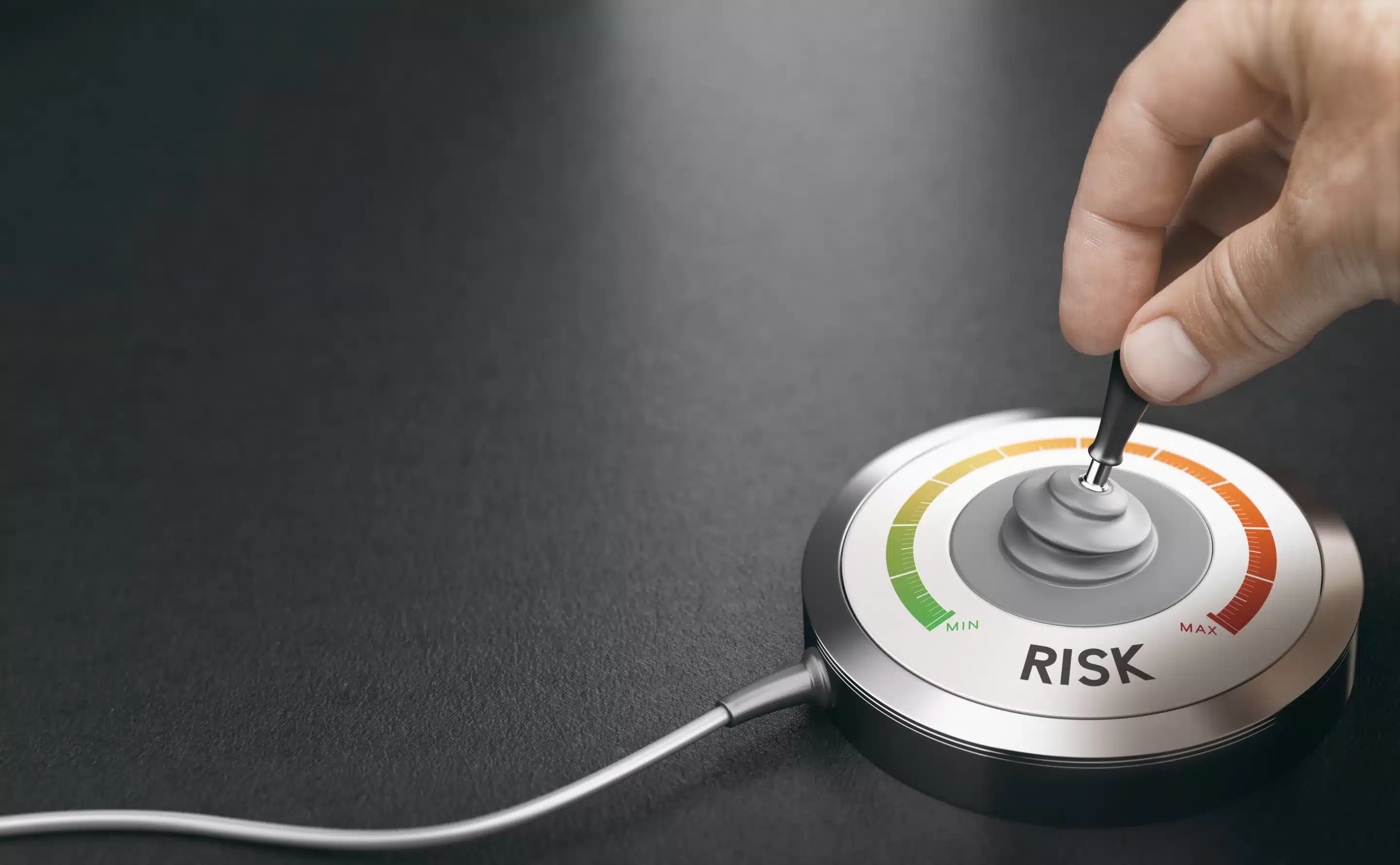
Resources

Learn more about Rootd:

